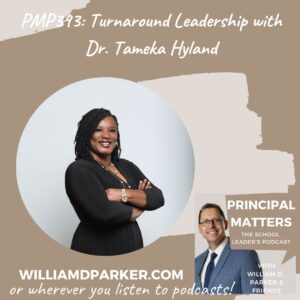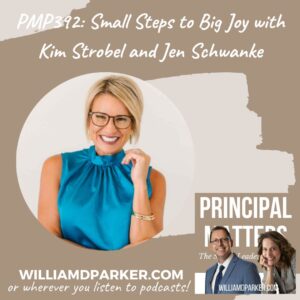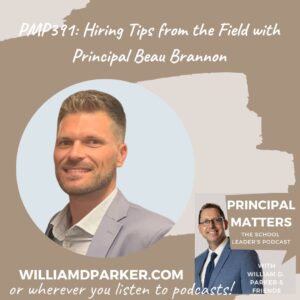Podcast: Play in new window | Download
As schools re-open across the globe, Principal Matters listeners have been sharing common experiences and lessons learned, including in Ireland.

Toirdealbhach Ó Lionáird serves a principal of Coláiste Ghobnatan, a second level high school in southwest Ireland. With 235 students, he has been the Principal there since 2017 and Deputy there since 2012. In addition, he teaches classes in French and English. His master’s thesis was a study in the experiences of school principals’ experiences.
Listen to the entire episode for valuable lessons. Here are some additional questions we discuss:
WDP: Can you share more about what would helpful for listeners to know about you and your school?
T. Ó Lionáird: In short, I am a serving principal of a second level school (high school) here in southwest Ireland. It’s a small, rural school, situated in what we call a “Gaeltacht” area where the Irish language was once the predominant language.
These days a lot of language planning is in hand to reinvigorate the language and inspire the younger generation.
We have a school population of 235 students, the majority of whom are fed from the local primary schools. The projected growth is for numbers to reach 300 by 2030, which puts us in line for an extension to the school building, currently at design stage. The teaching staff consists of 20 full-timers, an office administrator, janitor and cleaner.
Our governing body is Cork Education and Training Board which has a remit of 34 colleges ranging from primary through second level to third level. I’m lucky to have access to this solid, readily available network of good colleagues.
I’m 44 now but have been serving a Principal since 2017, having held the position of Deputy for 5 years prior to that. I teach classes of French and English. An inclination to lead seems to come easily to me (not that leadership is at all easy) as I’ve always striven to help others and improve on the status quo.
I have taken on further study every 5 years or so and have particular interest in other principals’ experiences (my thesis in a Masters completed in 2020 focused on this topic), along with student voice and immersion education.
Once upon a time, I had aspirations to a football player and touched on the national team, but my focus has taken me elsewhere.
WDP: How have you stayed connected with your school community during the pandemic?
T. Ó Lionáird: It has been pretty challenging. Since the 12thof March, 2020, Ireland has been shut down. For the new school year, we used Microsoft 365 to begin again in September 2020. We have managed to stay connected with that platform, but we also use phone calls to stay in touch.
WDP: When you do expect to be back in-person?
T. Ó Lionáird: It’s a bit of a political football in Ireland. It’s likely the senior students will return first in March 2021. A certain cohort of students has already returned. We are looking forward to be back even with masks.
WDP: What new routines have you discovered?
T. Ó Lionáird: Each class group has a teacher or tutor who checks in with students, and we have a guidance counselor who connects with them too. We also have a challenge with students for being outside and taking steps to stay healthy.
WDP: We all share similar experiences. You researched principal practice in your master’s thesis. What are some takeaways from that research?
T. Ó Lionáird: The context I’m working in is immersion education, teaching in the language of Irish. I wanted to see what principal experiences were like outside of areas that speak Irish. At the end, I realized we had very similar experiences. One suggestion I had was for principals to have more continuity in preparation and continuing education.
No doubt, COVID has created issues and challenges for principals whose students are expected to take state exams. We are trying to find another way to access in a way other than through exams as students don’t presently have a way to recoup if they miss the exam or are sick during examinations.
WDP: What advice would you have for aspiring education leaders?
T. Ó Lionáird: I think the initial impression I had of leadership was one of workload. I actually had no idea how much there was to do as a principal. When I was a deputy, I focused more on compartmentalized areas. But the magnitude of the principal’s work is amazing. You have to learn to park it. When you lock the door of your office, leave the work there. Be prepared on what is to be expected so that you have your head around what it is you will want to achieve. A small caveat would be that I probably should have invested in distributive leadership – to better share the workload with others.
WDP: Can you explain how your school is committed to student leadership?
T. Ó Lionáird: We allow our students to have input in their learning. Students should have a voice of what happens in the classroom and be able to co-construct lessons. Students are not just along for the ride, they should be recognized for the potential they have in shaping learning.
WDP: I agree. Principals who seem to navigate best are the ones who also rely on students for feedback. What other ideas would you like to leave with listeners?
T. Ó Lionáird: I would not consider myself an expert on immersion education, but I’ve realized how much I have had to learn. Also, action research and self-study is an area is an area that fascinates me. I’m glad to collaborate and can be reached via Twitter at @toirdealbhach.
Now It’s Your Turn
What unique lessons have you learned during this school year that you realize are common or uncommon from others? Ask that question to your teachers and staff and reflect on what ideas you want to carry into future practice in your school. Listen to the entire conversation for even more takeaways!


